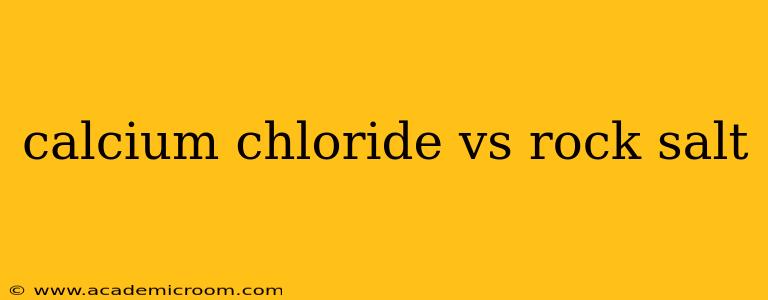Winter's icy grip can make roads and walkways treacherous. The battle against ice often comes down to two main contenders: calcium chloride and rock salt (sodium chloride). Both are effective de-icers, but they have distinct differences that impact their effectiveness, cost, and environmental impact. This comprehensive guide will delve into the pros and cons of each, helping you make the informed choice for your needs.
What is Calcium Chloride?
Calcium chloride (CaCl₂) is a chemical compound that, when applied to ice, lowers the freezing point of water through a process called freezing-point depression. This means it melts ice at lower temperatures than rock salt, making it effective even in extremely cold conditions. It's also a hygroscopic substance, meaning it absorbs moisture from the air, further aiding in ice melting.
What is Rock Salt (Sodium Chloride)?
Rock salt, or sodium chloride (NaCl), is the common table salt we use in cooking, but in a coarser, less refined form. It's a cost-effective de-icer that effectively melts ice through the same freezing-point depression mechanism as calcium chloride. However, its effectiveness is limited by temperature; it becomes less effective below approximately 20°F (-7°C).
Calcium Chloride vs. Rock Salt: A Detailed Comparison
| Feature | Calcium Chloride | Rock Salt (Sodium Chloride) |
|---|---|---|
| Melting Point Depression | Greater; effective at lower temperatures | Less; less effective at lower temperatures |
| Cost | Generally more expensive | Generally less expensive |
| Environmental Impact | Can be more corrosive to concrete and metals; Potential for chloride build-up in soil and water | Less corrosive; potential for sodium build-up |
| Application | Often preferred for pre-treatment and extreme cold | Commonly used for general de-icing |
| Effectiveness | Superior in freezing temperatures | Effective in milder freezing temperatures |
How Effective is Calcium Chloride at Lower Temperatures?
Calcium chloride's effectiveness extends to significantly lower temperatures than rock salt. While rock salt struggles below 20°F (-7°C), calcium chloride can remain effective down to -25°F (-32°C) or even lower, depending on the concentration and formulation. This makes it a popular choice for areas experiencing extremely cold winters.
Is Calcium Chloride Harmful to the Environment?
Calcium chloride's impact on the environment is a subject of ongoing discussion. While it is generally considered less toxic than some other de-icing agents, it can contribute to chloride build-up in soil and waterways. This excess chloride can harm vegetation and aquatic life. The environmental impact is less severe than with some other de-icers but requires responsible application and consideration of potential runoff.
Does Rock Salt Damage Concrete?
Rock salt is less corrosive than calcium chloride, but prolonged or excessive use can still contribute to concrete damage over time. The salt can penetrate the concrete's pores, leading to deterioration. This damage is usually more pronounced in older or already weakened concrete.
Which is Better for the Environment, Calcium Chloride or Rock Salt?
Both calcium chloride and rock salt present potential environmental concerns. Rock salt's impact primarily involves sodium accumulation, while calcium chloride leads to chloride accumulation. The "better" option depends on the specific environmental context and the potential for runoff into sensitive ecosystems. Sustainable de-icing practices, such as minimizing application and using alternative methods like sand or gravel where appropriate, are crucial regardless of the chosen de-icer.
Which De-Icer Should I Use?
The best de-icer depends on your specific needs and priorities.
- Choose calcium chloride if: You need effective de-icing in extremely cold temperatures, and cost is a secondary concern.
- Choose rock salt if: Cost is your primary concern and temperatures rarely fall below 20°F (-7°C).
By understanding the differences between calcium chloride and rock salt, you can make an informed decision that balances effectiveness, cost, and environmental considerations. Remember that responsible application and use of any de-icer is essential for minimizing environmental impact.
